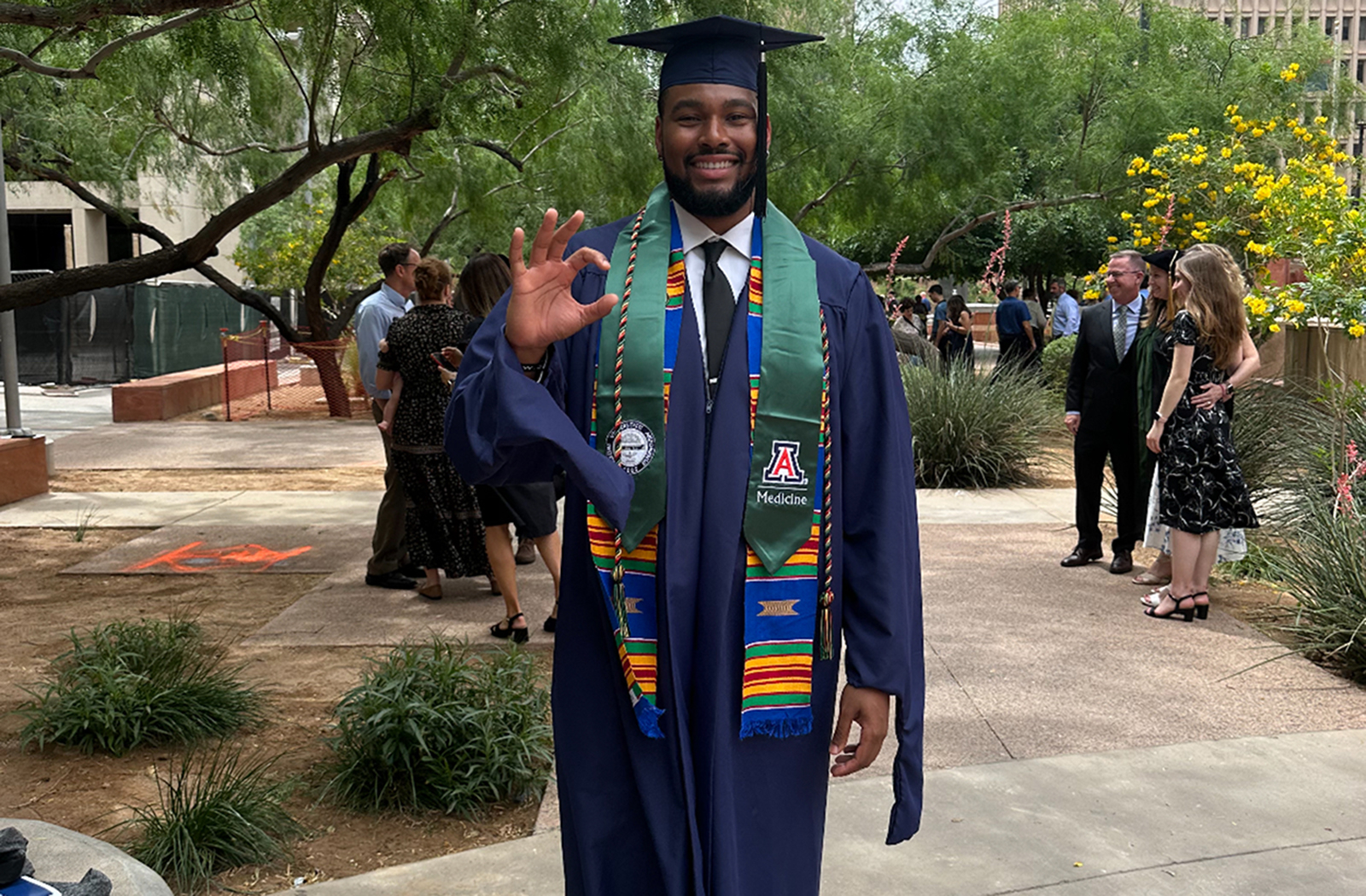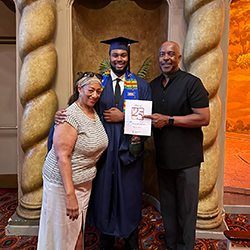
White Coat Profile: Trevon Brooks

The White Coat Ceremony marks the first time a medical student will don his or her white coat, the defining symbol of a physician. The coat bestows a great honor on each student, and with it comes a responsibility to uphold the trust of every patient they will encounter. The Class of 2029 will receive their white coats on July 18 during a ceremony that begins at 3:30 p.m. in Phoenix Symphony Hall.
Meet Trevon Brooks
Born in Chandler, Arizona, Trevon Brooks spent part of his early childhood in Virginia Beach, Virginia, before moving back to Arizona his freshman year of high school.
For his undergraduate studies, Brooks attended the University of Arizona and earned his degree majoring in physiology and minoring in biochemistry and business administration. During his last two years of undergraduate studies, he worked as a medical scribe at a local emergency room.
In the fall of 2022, Brooks returned to school to earn his master of public health. After graduating in 2024, he joined the Pathway Scholars Program (PSP) at the University of Arizona College of Medicine – Phoenix. Through that program, he completed his second master’s degree in medical studies.
Brooks credits his parents’ unwavering belief in him as what has kept him motivated and grounded during his road to medical school. He said he leans on them for guidance and encouragement. Brooks also credits his friends as people who push him to be his best and remind him to enjoy the journey even when it gets tough.

Path toward Medicine
What was the spark that led you to become a physician?
The spark that led me to pursue becoming a physician wasn’t just one moment; it was a series of experiences that stacked up over time and made it impossible for me to imagine doing anything else.
Growing up, I spent my summer breaks helping care for my grandmother, who battled dementia, and my uncle, who fought both prostate and colorectal cancer. Those days taught me what it really means to show up for someone when they’re at their most vulnerable and how powerful compassionate care can be for both the patient and the family around them.
Sitting in my high school anatomy and physiology class, I remember being fascinated by how detailed and intricate the human body is — how every tiny part has a purpose and how it all connects. I’d go home and get even more hooked watching shows like Grey’s Anatomy and Bones imagining what it’d be like to be the person making the tough calls or figuring out a diagnosis no one else could crack.
Then there were my own injuries; sports were a huge part of my life, until they weren’t. Four concussions before I turned 18 and micro fractures in my back forced me to sit out my entire junior year. Being sidelined showed me the other side of medicine — what it’s like to trust your doctors, to rely on someone else’s expertise to get you back to doing what you love.
All of it together — my family’s health struggles, my own time as a patient and that early fascination with how the body works — built this fire in me to be that person for someone else — to be the physician who listens, explains, treats and heals. That’s the spark that keeps me going.
Did you do any volunteering in health fields prior to medical school?
Before starting medical school, I did quite a bit of volunteering in the community, especially in areas connected to health and basic needs.
One thing that really stuck with me was my time volunteering at Z Mansion in Tucson. I helped serve meals to the unhoused population downtown, handed out hygiene supplies, and spent time talking with people to help them feel seen and heard.
Being there showed me how social factors impact health and well-being. It made me appreciate the importance of meeting people where they are and reminded me why I want to work in medicine — not just to treat illness, but to advocate for those who often get overlooked.
The College of Medicine – Phoenix
Why did you choose the College of Medicine – Phoenix?
Joining the PSP was one of the best decisions I have ever made. After taking two gap years to get real experience in the health field, from working for a vascular surgeon’s office and in a level one trauma center to earning my first master’s in public health, I knew I needed a program that would really challenge me and make sure I was prepared to hit the ground running in medical school.
The PSP was exactly that; it is rigorous, supportive and tailored to students like me who wanted to strengthen their foundation.
On top of that, choosing the University of Arizona College of Medicine – Phoenix was about being closer to family. After spending eight years in Tucson, I wanted to come back home. Having my support system nearby means everything to me, especially when I know there will be times in medical school that test me in ways I can’t predict yet.
So, for me, the U of A College of Medicine – Phoenix felt like the perfect fit — the right program, the right people and the right place to help me grow into the physician I want to be.
What excites you most about beginning medical school?
I’m finally starting the journey to fulfill a lifelong dream. I chose a career where I get to help people and impact lives every single day, and now it is real. I’m stepping into a role where I’ll have the power to make a difference not just for individual patients but for whole communities.
Giving back to the people around me and helping lift others up is everything to me. It’s bigger than just me. Representation matters and being able to show kids in my community, especially minority kids, that we belong here and that we are represented in medicine — that fires me up more than anything.
So, what excites me most is knowing that this is just the beginning of all the lives I will touch and the doors I will help open for the people coming up behind me.
Significance of the White Coat
What does the white coat mean to you?
It is so much more than just a piece of clothing. It is a symbol of hard work, dedication and perseverance. When I see a white coat, I see all the late nights studying, the endless hours of preparation and the mental toughness it takes to be ready to step into a room and care for someone when they need it most.
It represents being a leader in the community — someone people can trust when they’re at their most fragile. Someone who shows up, listens and does everything they can to help patients get back to who they were.
For me personally, the white coat is also a symbol of fulfilling a lifelong dream. Putting it on is an honor and a privilege, and it is one that I do not take lightly for a second. It’s a reminder of where I have been, what I have overcome and the responsibility I now carry to give the best of myself to others every day.
About the College
Founded in 2007, the University of Arizona College of Medicine – Phoenix inspires and trains exemplary physicians, scientists and leaders to advance its core missions in education, research, clinical care and service to communities across Arizona. The college’s strength lies in our collaborations and partnerships with clinical affiliates, community organizations and industry sponsors. With our primary affiliate, Banner Health, we are recognized as the premier academic medical center in Phoenix. As an anchor institution of the Phoenix Bioscience Core, the college is home to signature research programs in neurosciences, cardiopulmonary diseases, immunology, informatics and metabolism. These focus areas uniquely position us to drive biomedical research and bolster economic development in the region.
As an urban institution with strong roots in rural and tribal health, the college has graduated more than 1,000 physicians and matriculates 130 students each year. Greater than 60% of matriculating students are from Arizona and many continue training at our GME sponsored residency programs, ultimately pursuing local academic and community-based opportunities. While our traditional four-year program continues to thrive, we will launch our recently approved accelerated three-year medical student curriculum with exclusive focus on primary care. This program is designed to further enhance workforce retention needs across Arizona.
The college has embarked on our strategic plan for 2025 to 2030. Learn more.